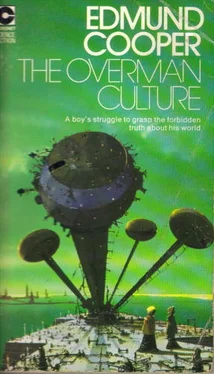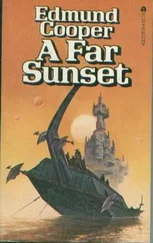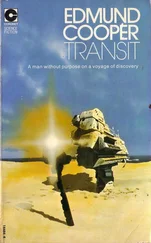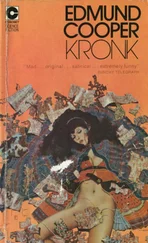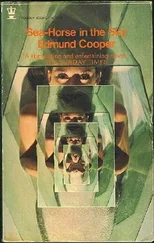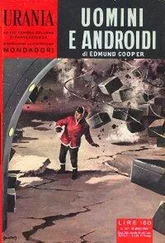Edmund Cooper - The Overman Culture
Здесь есть возможность читать онлайн «Edmund Cooper - The Overman Culture» весь текст электронной книги совершенно бесплатно (целиком полную версию без сокращений). В некоторых случаях можно слушать аудио, скачать через торрент в формате fb2 и присутствует краткое содержание. Город: London, Год выпуска: 1977, ISBN: 1977, Издательство: Coronet Books, Жанр: Фантастика и фэнтези, на английском языке. Описание произведения, (предисловие) а так же отзывы посетителей доступны на портале библиотеки ЛибКат.
- Название:The Overman Culture
- Автор:
- Издательство:Coronet Books
- Жанр:
- Год:1977
- Город:London
- ISBN:978-034017860
- Рейтинг книги:5 / 5. Голосов: 1
-
Избранное:Добавить в избранное
- Отзывы:
-
Ваша оценка:
- 100
- 1
- 2
- 3
- 4
- 5
The Overman Culture: краткое содержание, описание и аннотация
Предлагаем к чтению аннотацию, описание, краткое содержание или предисловие (зависит от того, что написал сам автор книги «The Overman Culture»). Если вы не нашли необходимую информацию о книге — напишите в комментариях, мы постараемся отыскать её.
The Overman Culture — читать онлайн бесплатно полную книгу (весь текст) целиком
Ниже представлен текст книги, разбитый по страницам. Система сохранения места последней прочитанной страницы, позволяет с удобством читать онлайн бесплатно книгу «The Overman Culture», без необходимости каждый раз заново искать на чём Вы остановились. Поставьте закладку, и сможете в любой момент перейти на страницу, на которой закончили чтение.
Интервал:
Закладка:
The implications hit him with an almost physical impact. He was no longer depressed. He forgot his fatigue.
Excitement tingled through his limbs. He began to laugh hysterically, and had to make an effort to stop. All he had found was another mystery, but at least he had found something.
He rushed back to Emily, falling down twice in his eagerness to reach her and tell her the news. At first, she simply refused to believe it.
“But it can’t, Michael. It can’t…. It just can’t go back to London.”
“Emily it does—and we are going on to prove it.”
“Oh, Michael. It’s silly, but—but I’m terribly afraid. I’m afraid that something dreadful will happen.”
He lifted her up and kissed her gently without passion, almost oblivious of the soft breasts that pressed against him.
“Nothing dreadful will happen, I promise. We go on. We must go on. I promise we will not be home too late.”
It was dark long before they got home. But not too dark for Michael to discover, triumphantly, the secret of the Thames. Emily was exhausted, but bravely she somehow managed to keep on going. It was dusk by the time they came to Richmond Bridge, darker by the time they passed Kew Bridge. The moon was high when they reached Chelsea Bridge. The next bridge would be Westminster. Back full circle! There was no need to follow the Thames any farther. It was not a river. It was just a great, uneven ring of flowing water.
From Chelsea Bridge to the Bronte house in Victoria Street was not far; but to Emily it seemed an endless distance. Michael felt sorry for her and guilty at having made her walk so far; but the guilt was submerged in a heady sense of elation.
When they reached Victoria Street he made Emily rest a little before he took her home. They both realized it was important for her not to arrive back in a distressed condition.
Michael cooked up a cover story; and when they reached the Bronte house, Emily—with a tremendous effort—walked as if she felt quite fresh and had enjoyed a pleasant picnic. Michael hobbled, wincing with pain.
He apologized to Mr. and Mrs. Bronte for not returning Emily earlier; but he had had the bad luck to sprain his ankle on Hampstead Heath, and he had needed to take several rests on the way back.
Mr. Bronte lectured him on being careless and on his duty to ensure that Emily came home at a reasonable time. He hoped that Michael would be more careful in future, otherwise it might not be possible for him to take out Emily alone. Michael assured Mr. Bronte that he really was very sorry and that he would be much more careful in future. Mrs. Bronte wanted to bathe his ankle; but Michael thanked her and assured her that he would prefer to wait till he got home.
Emily walked down the garden path with him. She kissed him very quickly and said: “I love you.” Then she went back into the house and closed the door.
Michael gazed up at the stars, high over a river that was not a real river. High, perhaps, over a world that was not a real world.
He was too tired to think clearly; but he knew that something very important had been achieved.
13
“So we are contained,” said Ernest grimly. “The Thames is not a river flowing to the sea, and what we call London is surrounded by a vast moat. There is no truth but untruth. There is no reason but unreason.”
Ernest and Michael were standing on Waterloo Bridge. The afternoon session of school had ended. Shortly they would separate and go home for tea.
“All these bridges,” said Michael. “The roads have to go somewhere.”
“Do they?” Ernest was bitter. “I doubt it. Something tells me that our little world is full of subtle circles…. Sometimes I feel that we must be like animals in a zoo or—or tender plants that have, to be raised in a greenhouse.”
Suddenly, Michael remembered fragments of the dream he had had long ago—long before he had begun to shave, long before he had discovered the sweet excitement lurking in Emily’s rounded body. Long ago in a world of nightmare innocence.
He told Ernest all that he could remember of the dream. Then, for a minute or two, neither of them said anything. At last, Ernest broke the silence.
“A greenhouse,” he said. “A greenhouse…. Let us suppose the absurd. Let us suppose that the drybones can control our dreams in some way, perhaps even some of our waking thoughts…. Your nightmare could have been manufactured. It could have been used as—as a kind of preparation.” He shrugged. “Just a crazy notion to fit a crazy situation.”
“It doesn’t matter that it’s crazy,” said Michael. Then he added strangely: “What does matter is that it is not—not elegant. I mean, it doesn’t feel right. It feels… It feels… Oh, I don’t know what I mean.”
Ernest grinned. “I like your use of words. Not elegant. I must remember that. I know what you mean, though. You reject the idea because it is untidy. But the greenhouse idea—that is an elegant possibility. Outside what we call London, the climate is too cold; the winds are too fierce; the animals are too dangerous for poor creatures such as we. Right?”
“Something like that,” admitted Michael. “We are prisoners, but protected prisoners.”
“Perverse, protected prisoners,” corrected Ernest. “We reject protection. Such is our madness that we wish to escape into danger—if danger is the price of freedom…. Or truth.”
Michael stared down over the side of the bridge at the water. “How long did it take you to find the library?” he asked.
“About two hours, not more. I was too busy trying to make a map to pay much attention to time. It is in an odd little place called Apollo Twelve Square, about twenty minutes away from Piccadilly Circus. I’m sure I have seen Apollo Twelve Square before. I used to go walking by myself quite a lot before we joined the Family. But I didn’t notice it.”
“Perhaps because you couldn’t read the words,” ventured Michael.
“Perhaps. I ought to have noticed it, though. It is the most shabby building in the square. It’s all boarded up, and it looks as if it has not been used for a thousand years.” He laughed mirthlessly. “Why should it be used? Nobody needs to read. Nobody wants to read.”
“Except us.”
“Except us. And we are crazy.”
Michael was still staring at the water. “In the country of the mad,” he murmured, “the sane man is crazy.”
“What did you say?” There was an urgency in Ernest’s voice.
“Oh, nothing much. I’m sorry. I was just thinking and talking to myself. I’m sorry, Ernest.”
“What did you say?”
Michael looked at him in surprise. “In the country of the mad, the sane man is crazy…. You said that we were crazy and—”
“You’ve got it!” Ernest was almost dancing with excitement. “You have defined the predicament. You have stated our philosophy.”
“Now, who’s drunk on words? The drybones don’t use words like that. You only get them from flat people on a screen. People you can’t talk to. So how do you know what the words mean?”
“Because I do know. Because I collect words. I compare them, I define them. They are precious tools. You need words to think…. What about all the thoughts you couldn’t have until you found words to fit them?”
Michael laughed at his intensity. “All right, Ernest. Calm down. So the world is mad and we are crazy because we are sane. It gets us no further. Let us keep to the facts. You are sure the words were ‘London Library’?”
“Absolutely sure. I copied them down. I didn’t know how to spell ‘library’ before. But now I’ll know until I die.”
“And you are sure that you were followed?”
Читать дальшеИнтервал:
Закладка:
Похожие книги на «The Overman Culture»
Представляем Вашему вниманию похожие книги на «The Overman Culture» списком для выбора. Мы отобрали схожую по названию и смыслу литературу в надежде предоставить читателям больше вариантов отыскать новые, интересные, ещё непрочитанные произведения.
Обсуждение, отзывы о книге «The Overman Culture» и просто собственные мнения читателей. Оставьте ваши комментарии, напишите, что Вы думаете о произведении, его смысле или главных героях. Укажите что конкретно понравилось, а что нет, и почему Вы так считаете.
